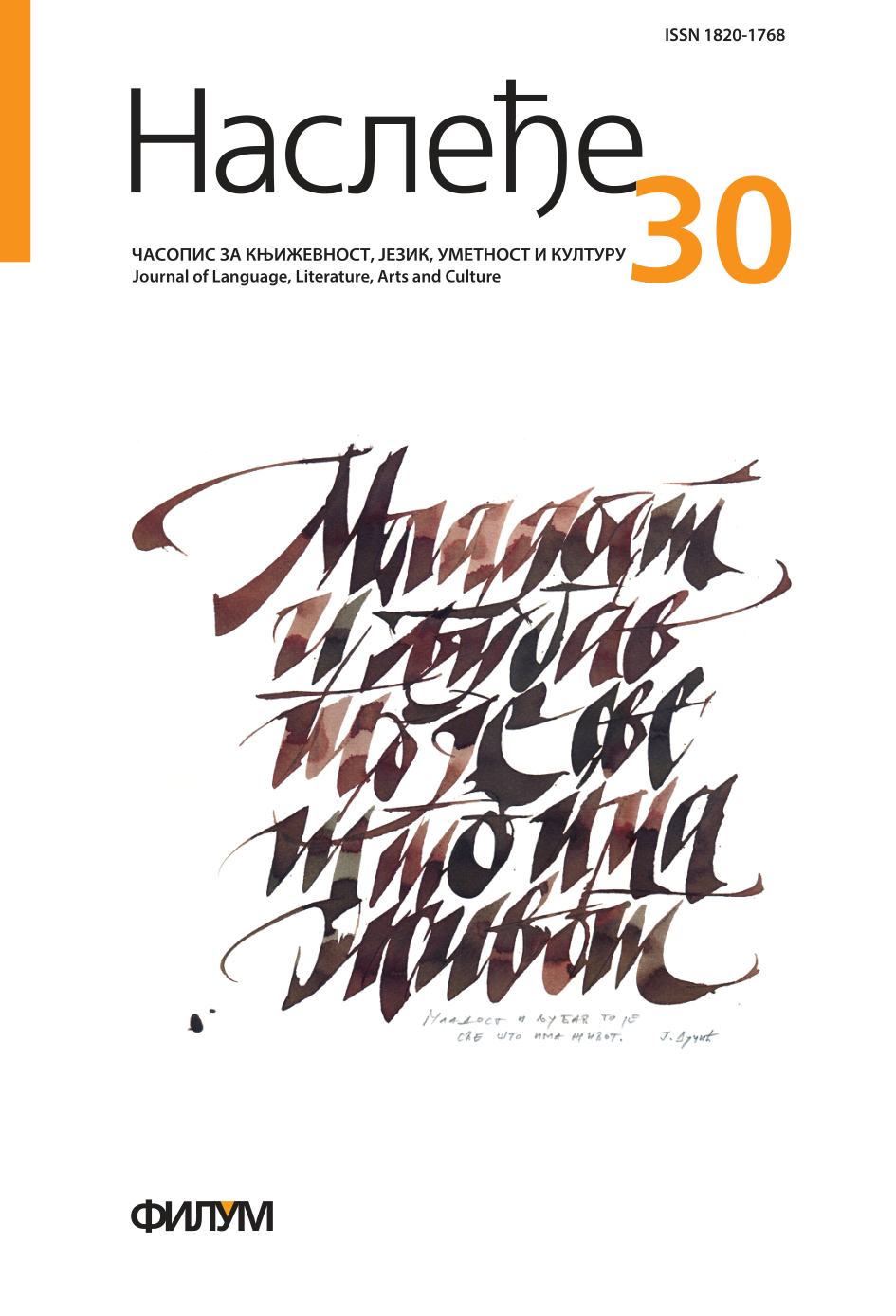END-LESS DECONSTRUCTION OF THE SELF IN SAMUEL BECKETT’S NOVEL THE UNNAMABLE
Кључне речи:
Beckett, The Unnamable, poststructuralism, deconstruction, Derrida, body, identity, ideologyСажетак
The aim of this paper is to interpret Samuel Beckett’s novel The Unnamable inside the framework of poststructuralist criticism, primarily that of Jacques Derrida. The first part of the paper is dedicated to exploring Beckett’s specific, bilingual situation in relation to how The Unnamable is narratively constructed. The main analysis focuses on the novel’s narrative structure as a process of end-less discursive deconstruction of the narrator’s self, which, nevertheless, continuously aspires toward that end, toward silence. Special emphasis is placed on the analysis of the discursive treatment of the body, narratively positioned as the cultural product and physical setting of such discourse, but also as an insurmountable obstacle in the process of self-deconstruction, which can only go so far. We come to the conclusion that it is via The Unnamable’s stream-of-consciousness narration and its attempted dissolution of the self, established in the Western metaphysical mindset, that Beckett most radically criticized the ideological conception of identity.
Референце
Beckett 2009: S. Beckett, Three Novels: Molloy, Malone Dies, The Unnamable, New York: Grove Press.
Begam 1997: R. Begam, Samuel Beckett and the End of Modernity, Stanford: Stanford University Press.
Brater 2011: E. Brater, Beckett’s “Beckett”: So Many Words for Silence, in: H. Bloom (ed.), Samuel Beckett (Bloom’s Modern Critical Views), New York: Infobase Publishing, 115-128.
Butler 1989: J. Butler, Foucault and the Paradox of Bodily Inscriptions, The Journal of Philosophy, 86 (11), 601-607.
Butler 1993: J. Butler, Bodies That Matter: On the Discursive Limits of “Sex”, New York & London: Routledge.
Camus 1991: A. Camus, The Myth of Sisyphus: And Other Essays, New York: Vintage.
Carrière 2005: J. F. Carrière, Samuel Beckett and Bilingualism: How the Return to English Influences the Later Writing Style and Gender Roles of All that Fall and Happy Days, PhD Dissertation, Louisiana State University.
Cockerham 1975: H. Cockerham, Bilingual Playwright, in: Katherine Worth (ed.), Beckett the Shape Changer: A Symposium, London, Boston: Routledge & Kegan Paul, 139-161.
Connor 1988: S. Connor, Samuel Beckett: Repetition, Theory, and Text. Oxford: Basil Blackwell.
Cornwell 1973: E. F. Cornwell, The Flight from Self, PMLA, 88 (1), 41-51.
Derrida 1969: J. Derrida, The Ends of Man, Philosophy and Phenomenological Research, 30 (1), 31-57.
Derrida 1977: J. Derrida, Signature Event Context, in: Limited Inc, Evanston, IL: Northwestern University Press, 1-24.
Derrida 1993: J. Derrida, Memoirs of the Blind: The Self-Portrait and Other Ruins, Chicago: The University of Chicago Press.
Derrida 2005: J. Derrida, Structure, Sign and Play in the Discourse of the Human Sciences, in Writing and Difference, London & New York: Routledge, 351-370.
Edwards 1992: M. Edwards, Beckett’s French, Translation and Literature, 1, 68-83.
Esslin 2001: M. Esslin, The Theatre of the Absurd, London: Methuen Drama.
Foucault 1994: M. Foucault, Two Lectures, in: N. B. Dirks, G. Eley, S. B. Ortner (eds.),
Culture/power/history: A Reader in Contemporary Social Theory, Princeton: Princeton University Press, 1994, 200-221.
Gerzić 2010: B. Gerzić, Samjuel Beket: jedna hronologija, Novi Sad: Polja: časopis za kulturu, umetnost i društvena pitanja, 464, 167-182.
Gontarski 2010: S. E. Gontarski, A Companion to Samuel Beckett, Chichester, West Sussex: Wiley-Blackwell.
Miletić 2008: T. Miletić, European Literary Immigration into the French Language: Readings of Gary, Kristof, Kundera and Semprun, Amsterdam: Rodopi.
Schwalm 1997: H. Schwalm, Beckett’s Trilogy and the Limits of Self-Deconstruction, Samuel Beckett Today / Aujourd’hui, 6, 181-192.
Sultan 2004: S. S. Sultan, The Critical Aspects of Beckett’s “Trilogy”, Samuel Beckett Today / Aujourd’hui, 14, 421-435.
Tešanović 2013: B. Tešanović, Sistem projekcije i programi pisanja u romanu Malon umire Samjuela Beketa, Beograd: Književna istorija, 149, 135-158.
Todorović 2009: P. Todorović, Problem identiteta pripovedača Beketove trilogije, Beograd: Književna istorija, 137/138, 425-441.






